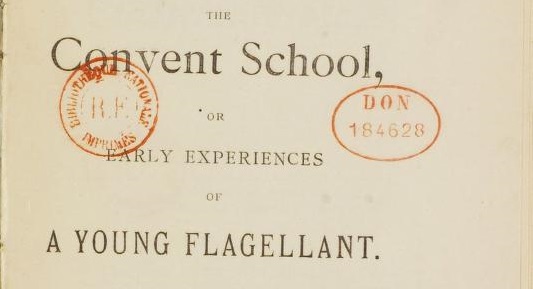Due to the holiday weekend in the US, and a toddler who refused to nap while traveling, I wasn’t able to finish my planned post following up on last week’s discussion of Alphas and Alphaholes. Instead, here’s a bonus review from some of my extracurricular research reading.
Does late Victorian erotica survive for the modern day reader? Thanks to digitization projects, the answer is yes. There are some very smutty texts available through Project Gutenberg, Internet Archive and other sources. The Convent School was one of the first Victorian erotica texts I found. Perhaps it stands as a good example of the difference between romance and erotica: if romance is focused on the emotional journey of the characters and the happy ever after, an erotica piece such as this has less plot and more focus on explicit sexual acts. That’s probably a discussion topic for another day, so let’s get on with The Convent School.
Title: The Convent School, or Early Experiences of A Young Flagellant
Author: Rosa Coote* (likely William Dugdale)
Original publication date: 1876
Setting time & place: 19th century England
He is… an English earl
She is… a young school girl who has been whipped at home, and at Catholic school, and now by her husband…
Reasons to read this title: If BDSM, especially whipping and humiliation, is your thing. Or if you’re interested in sexual depictions of religious figures.
A brief plot summary: Young Lucille is swatted on her behind by her father in presence of her governess, Miss Birch. (Because she’s getting whipped with a birch branch! So clever! …) After each session, father and governess, visibly excited, disappear into the governess’s room. At age 12, Lucille is sent to a convent school where she is also whipped and beaten by the mother superior and her staff. She takes revenge on a tattle-tale by sexually abusing another girl. The mother superior inducts her into a group of “favorites”, who are brought together to sexually play with each other, and also to act as “young men” to the mother superior by means of a strap-on. Finding the mother superior’s cunt both smelly and hairy, Lucille refuses dildo duty, calling down wrath and punishment upon herself: more flagellation.
Now 16, she escapes the convent and is briefly under protection of a young English lord, who turns out to be a friend of her betrothed. Because apparently she has been affianced to an Earl. Then she is married but not entirely happy—her husband neglects her in favor of horse racing. This leads to an adulterous but undetailed encounter with her husband’s friend. Unfortunately her husband finds out and the second half of the book is taken up by his punishment of her.
He takes her on a trip and lavishes attention upon her, then tricks her into confessing all her sins to a priest (himself in disguise). Then she is suspended by one foot and whipped extensively by her husband (still in guise of a priest) and another priest under the pretext that it will purge her of her sins. They bring out a massive red rubber dildo filled with some concoction to take the place of ejaculate and make sure she will never feel sexual pleasure again – I imagine some sort of acid. Her husband is so turned on by this that he fucks her at the end of the session. They leave her for a few days to recover, and then there is more of the same, culminating in her husband revealing that it’s been him all along, and this is his way of divorcing her.
She manages to flee back to her husband’s friend, who kills the Earl in a duel but dies himself a few years later. The book concludes by saying that she has continued to have other sexual partners and to engage in flagellation.
Fom a 21st century perspective, or at least my own perspective, this story was definitely squicky. No consent is given anywhere and while the framing of the narrative seems to imply that our heroine enjoys flagellation, nowhere in the moment does she say or think that she’s finding her flagellation experiences pleasurable. The youth of the protagonist and the punitive, nonconsensual nature of nearly all of the encounters described are all more concerning than exciting for me as a reader.
Here’s what Henry Spencer Ashbee, famous collector and catalogeer of erotica in the Victorian era, had to say about it:
The book is not altogether badly written; no part of the narrative however is attractive; on the contrary, the numerous flagellations, supplemented by filthy tortures, are insuperably tedious and revolting.
I have a vague sense that there is some significance in the connection between the Catholic religious figures and the sexualized flagellation. See, for instance, this discussion on the pornography of pain and anti-Catholic sexual views of various mortifications of the flesh, an edited excerpt from Pain, Pleasure and Perversity: Discourses of Suffering in Seventeenth-Century England. As with romance, there hasn’t been a literate time period when humans weren’t writing erotica and this is just one title of many. Further reading will allow me to speculate whether it is typical of the period or not, but there are certainly a lot of mentions of monks and flagellation throughout Ashbee’s bibliography.
*The name ‘Rosa Coote’ is reused in The League of Extraordinary Gentlemen. According to Wikipedia: “She is Headmistress of the Correctional Academy for Wayward Gentlewomen, where the League discover Hawley Griffin, the Invisible Man, impregnating her students (who believe he is the “Holy Spirit”).”



